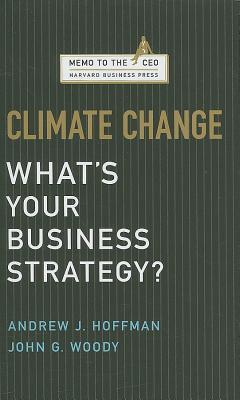Climate Change Summary
4 min read ⌚
 What’s Your Business Strategy?
What’s Your Business Strategy?
Part of the respected Harvard Business Press series “Memo to the CEO,” “Climate Change: What’s Your Business Strategy?” is a concise volume covering all you need to know about climate change and how it may affect your business. And according to Andrew Hoffman and John G. Woody, knowing your company’s “carbon footprint,” reducing it and getting a say in the matters is the right way to go!
About Andrew J. Hoffman and John G. Woody
 Andrew J. Hoffman is a Professor of Sustainable Enterprise at the University of Michigan. He is one of the leading authorities on the implications of environmental change on business. Hoffman holds a Ph.D. from MIT, and has authored over 100 articles and 15 books. Find out more at http://www.andrewhoffman.net/.
Andrew J. Hoffman is a Professor of Sustainable Enterprise at the University of Michigan. He is one of the leading authorities on the implications of environmental change on business. Hoffman holds a Ph.D. from MIT, and has authored over 100 articles and 15 books. Find out more at http://www.andrewhoffman.net/.
 John G. Woody is a Vice President at NRG Energy. Previously, he worked as a Senior Consultant for Energy and Environmental Economics, Inc., an advisory service. He holds an M.S. in Energy Engineering from Stanford University and an MBA from Columbia Business School.
John G. Woody is a Vice President at NRG Energy. Previously, he worked as a Senior Consultant for Energy and Environmental Economics, Inc., an advisory service. He holds an M.S. in Energy Engineering from Stanford University and an MBA from Columbia Business School.
“Climate Change Summary”
There are very few things as divisive around the world as the issue of climate change.
However, the main focus of this slim volume which bears that exact same title is not to take a side in the debate – although, it understandably does; it’s to explain to you how, regardless of whether you’re a believer or a sceptic, climate change can affect your business, nevertheless.
So, in other words, it’s better to think of a strategy today, than to scratch your head tomorrow.
And the numbers prove this! We’ll just point out two: by 2030, 1% of the global GDP will be used per year to control green grass emissions! Or, to make it a bit more illustrative: that’s $446 billion!
And that fails to convey the public and the economic impact in full. You, especially if a CEO, don’t have such a luxury: you must know everything about global warming, in order to act accordingly!
And Hoffmann and Woody make things pretty easy for you. Because, after spending a 20-page chapter to investigate the business implications of climate change, they get right down to the job. And they present a three-part climate change strategy.
As any other strategy, this one begins with research as well. Or – knowing your carbon exposure. But, be thorough and careful. Because, there are both direct and indirect emissions. The direct come from burning fossil fuels in your production facilities. The indirect, however – suppliers, employees, customers – may amount to more!
Your job is to keep track of them carefully. Fortunately, there are many systems for registering emissions and you can opt for anyone of them.
Only then, you can move on to the second part of the strategy: learning how to cut the emissions. And here’s the best part: it comes with a secret benefit!
Namely, greening your company can benefit you financially in the long run! For example, using AI, big data, and serious statistical analysis, Google has managed to reduce its data center cooling bill by 40%! All the while helping the environment!
However, have in mind that the monetary benefit may not be immediate. In fact, some climate change business strategies will result in losses. But, only on the short run! Because, statistics have proven that cutting carbon emissions benefits companies strategically.
In other words – people prefer climate-aware companies nowadays. Who would have known: the green revolution has already started happening!
Which brings us to the third and final part of your strategy. Namely, influencing the policy-development process.
You see, the Kyoto Protocol is not the only environmental strategy out there. There are many more and regulations will tend to get stricter as the risks are likely to get more serious. So, now, many politicians and policy makers out there are all behind the green world idea, pushing for, say, carbon taxes.
And they need your help!
Use it to be part of the policy-making process. Not its victim.
Key Lessons from “Climate Change”
1. Find Out Your Carbon Exposure
2. Take Action to Cut Emissions
3. Get a Seat at the Table of the Policy Makers
Find Out Your Carbon Exposure
No matter how little you’re interested in the global warming debate, the fact that everybody is – affects you and your company. So, it’s time to start taking it into consideration. And the first step: discovering your carbon footprint and the extent to which some of the future policies may hurt your business.
Take Action to Cut Emissions
Once you discover how much carbon your company produces, it’s time to take some action. There are many different ones suggested by “Climate Change.” Some are easy (“low-hanging fruits”), such as upgrading your insulation or teaching your employees to turn off the light. Others are big (“silver bullets”), such as discovering how you can substitute one process with another of an eco-friendlier kind.
Get a Seat at the Table of the Policy Makers
Whether climate change is a thing or not – doesn’t concern you. What does is that almost every government of the world thinks it is. And for years now they try to find the right regulations to limit global warming. So, try to take part in the discussions. Because, otherwise, others will be discussing your future.
Like this summary? We’d Like to invite you to download our free 12 min app, for more amazing summaries and audiobooks.
Quotes
You should not think of climate change as an environmental issue at all. Instead, you should think of it as a market transition. Share on X The implications of addressing climate change are not uniform, and the burden will not fall evenly. Share on X At a minimum, all companies should know their exposure to the climate-change issue. Share on X Goals are meant to challenge your company and spur innovation, productivity increases, and cost savings. Share on X If you do not choose to consider climate change relevant to the valuation of your company and its assets, groups on Wall Street may do it for you. Share on X
Emir is the Head of Marketing at 12min. In his spare time, he loves to meditate and play soccer.


 What’s Your Business Strategy?
What’s Your Business Strategy?



